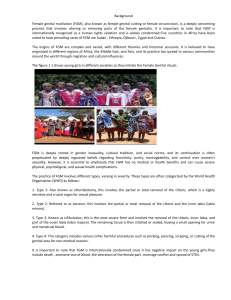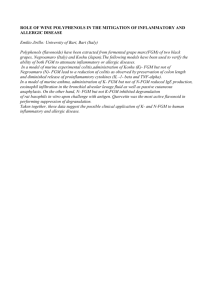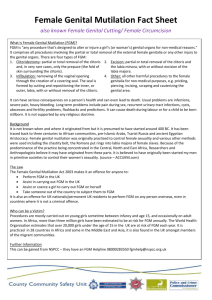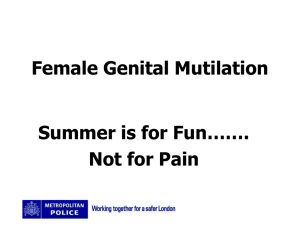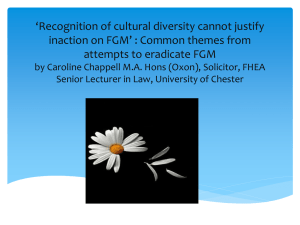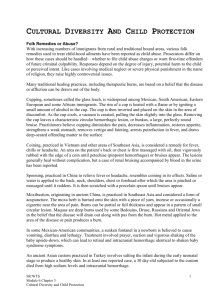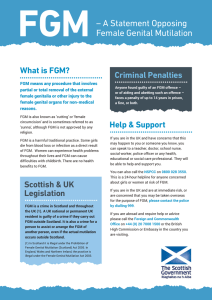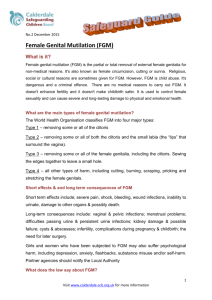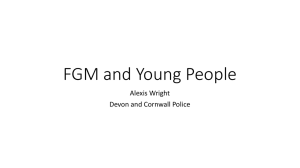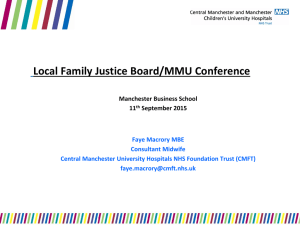The Scottish Refugee Council's Women's Policy Development
advertisement
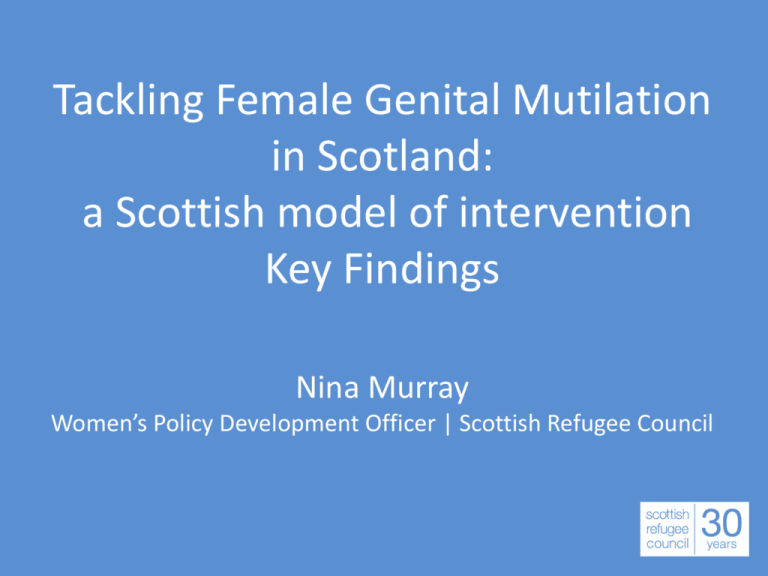
Tackling Female Genital Mutilation in Scotland: a Scottish model of intervention Key Findings Nina Murray Women’s Policy Development Officer | Scottish Refugee Council Female Genital Mutilation (FGM) “All procedures involving partial or total removal of the female external genitalia or other injury to the female genital organs for non-medical reasons.” (World Health Organisation, 2014) Clitoridectomy (Type I): partial or total removal of the clitoris; Excision (Type II): partial or total removal of the clitoris and labia minora, with/without excision of labia majora; Infibulation (Type III): narrowing of the vaginal opening by creating a covering seal, formed by cutting and repositioning the inner/outer labia, with or without removal of the clitoris; Other (Type IV): all other harmful procedures to the female genitalia for non-medical purposes, e.g. pricking, piercing, incising, scraping and cauterizing the genital area Research Aims • To identify the size and location of communities potentially affected by FGM living in Scotland • To determine promising FGM–related interventions within the EU which could have potential for further development in Scotland Potentially affected communities in Scotland Area Scotland Glasgow City Aberdeen City # people 24,012 8,647 4,241 Edinburgh, City of 3,583 Dundee City 1,126 Fife 679 Aberdeenshire 539 South Lanarkshire 515 There are communities potentially affected by FGM living in all of Scotland’s local authority areas. Potentially affected communities in Scotland Potentially affected communities in Scotland Births to mothers born in an FGM practising country 2001-2012 Effective interventions – 5 Ps • Participation • Policy, strategy and research • Provision of services • Protection • Prevention Participation It is important for communities to actually recognise that they themselves are a wealth of knowledge and can be instrumental in intervention. (Specialist NGO, UK) Participation • Policy and practice development should be shaped and driven by the experiences, needs and views of communities affected by FGM. Policy, strategy and research Authorities should …design a plan of action on FGM…and attach a budget to it and it should not only be developed by officials in their offices but… in collaboration with the communities themselves and with all stakeholders. (Academic, Belgium) Policy, strategy and research • Contextualise FGM as violence against women • Use Equally Safe as a vehicle to develop a national action plan on FGM • Provide national direction to ensure consistent recording in statutory services • Invest in support for communities to affect longterm behaviour change • Ensure evaluation built into all interventions Provision of services Specialist services tend to focus around maternity services and that’s because in general women with FGM may not seek to come into contact with healthcare professionals but the one time they will is when they’re pregnant. (Medical Practitioner, UK) Provision of services • Establish a specialist, multi-disciplinary ‘hub spoke’ FGM service in Scotland with clear pathways & links to named professionals • Consideration of specialist hospital consulting hours • Culturally competent care • Relevant health professionals trained to carry out sensitive inquiry around FGM Protection Does it mean for every woman who’s gone through FGM, we’re reporting her to social services because she’s going to be at risk or she’s going to be a perpetrator? … this is very repressive… (Specialist NGO, UK) Protection • Effective criminal justice response • Multi-agency approach & clearly identified roles • Clear ‘child intervention’ response to risk • Network of named professionals • Training for frontline professionals • Ensure FGM fully explored as a potential ground for international protection Prevention Social workers and health and welfare professionals have responsibilities...to protect girls from being cut; to advocate for services for affected women...and to engage with practising communities in processes to stop the practice. (Costello 2013) Prevention • Strong criminal justice response must be accompanied by community-based interventions • Clear direction on the role of frontline professionals in prevention • Campaigning & awareness-raising should be nonstigmatising & evidence-based • Training & guidance for professionals Next steps in Scotland • Scottish Government Short Life Working Group • National guidelines for practitioners • Funding for work with communities • Engagement with women, religious leaders, men, young people • RITES play • Care pathways and protocols • Resources & training • Specialist services? For further information www.scottishrefugeecouncil.org.uk Policy and Research > Research Reports nina.murray@scottishrefugeecouncil.org.uk 0141 223 7993 @scotrefcouncil www.fgmaware.org
